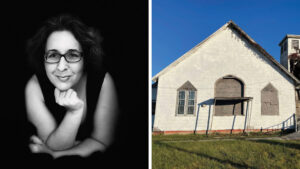“The best theater happens in conversation with the world around it,” says Johanna Gruenhut, producer of Everyman Theatre’s third annual “Salon Series: Women’s Voices.”
In the wake of the #MeToo movement, some of the world’s most critical conversations are being led by women. The series, which began Feb. 5 and ends April 2, offers women playwrights and Everyman’s female company members an opportunity to add their voices to the global discussion.
The Salon series was created as “sort of a response” to the theatrical company’s 25th anniversary season three years ago which “featured plays that were all written by men and all directed by men,” says Gruenhut. a Guilford resident. Afterward, “[Everyman artistic director] Vincent Lancisi asked the female resident acting company to choose plays they would like to see and read out loud.”
A play-reading series was a new concept for the theater. “We had to introduce audiences to what a reading is,” says Gruenhut, who directed “Sweat,” by Lynn Nottage, the first play in the series. “There’s no set, there are no costumes. The actors are in front of you with music stands, and they’re just going to read a play.”
The first year, “there was a little bit of audience hand-holding,” Gruenhut admits. But audiences responded to the experience: “It’s exhilarating because it’s a one-night-only event. All of your adrenaline is pumping. You know you’re giving audiences a once-in-a-lifetime opportunity to experience a play with each other.”
Gruenhut says the plays chosen the first year “weren’t new, but they were [penned by some of the] beacons of female playwriting” such as Wendy Wasserstein (“The Heidi Chronicles”) and Alice Childress (“Wedding Band”).
“I came on board in the middle of that season and sort of helped the women frame the plays that were chosen that year. Then, moving forward, I was the lead curator.”
Since the first season, Gruenhut says, “We’ve taken more risks. The first year was sort of an announcement — ‘Look at us.’ A lot of times women are marginalized. People think they only write plays about certain topics or certain ideas. Or [women playwrights] aren’t thought about at all.”
The notion of women’s under-representation is shared by the Kilroys, a group of playwrights and producers committed to obtaining gender parity for women playwrights. According to its website, since 2013 the Kilroys have compiled an annual list of “excellent un-[produced] and under-produced new plays by female and trans playwrights.”
Gruenhut says she uses the list to help her discover great female playwrights and plays during the selection process. The process involves “a lot of reading,” Gruenhut says, and then a lot of collaboration.
“The women and I have been working now together for three years. We rely on each other, not only for ideas but for inspiration,” says Gruenhut. “In April or May, I email the ladies and say, ‘Here are some the plays I’ve read this year that I really love. Read them. And then they’ll say, ‘I loved this play, or didn’t love this play … and can we throw this play into the mix?’ So, it becomes a gathering of minds.”
This year’s plays, though they were selected last year, “do shed light on the conversation that’s happening in the world now.” Gruenhut says. “I like to think of the series as ‘by women, for everyone.’”
Gruenhut, a New York City native who attended the Ramaz School, a modern Orthodox Jewish day school in Manhattan, says she was an actor in high school but later realized she wanted to get more involved in the broader storytelling experience.
“I think I stopped wanting to be an actor sometime in college,” says Gruenhut, a Boston University graduate. “It became clear [through directing and producing] that you can help guide a story from all these points of view to create one vision.”
Working in a small theater in Connecticut after college, Gruenhut says she found she liked the collaborative aspect of producing and directing, adding, “I like having other people in the room with me.”
She also found she could use her voice through directing and producing. “I consider myself a pretty political artist,” she says. “Producing is an offshoot of that. What do you do with all these great plays you believe in? If there’s a way to give them a home or a voice, you want to be able to do that.”
Married to Jonathan Flombaum, a fellow Ramaz School graduate, Gruenhut, is now a mother to three young children who attend Beth Tfiloh Dahan Community School. “It’s pretty busy!” she acknowledges, but she loves her work.
“I deeply believe that art has the power to change people and culture,” says Gruenhut. “Without culture, society breaks down. Theater and art don’t exist in a vacuum. They don’t exist by themselves on a stage. They exist because of people and the issues floating around. If we can use it to be a force of good, to help make progress, that is an amazing thing.”
To Gruenhut, this “is a very holy thing. I connect it to Judaism, to tikkun olam, the notion of healing the world, because that’s my spiritual lens.”
The Salon series continues on select Mondays from 6-10 p.m. with play readings on Feb. 19, March 5, March 19 and April 2. For information and a list of upcoming plays, visit everymantheatre.org.
Watch Gruenhut’s guest appearance on Jmore’s Weekend Agenda:
Erica Rimlinger is a Baltimore-based freelance writer.





